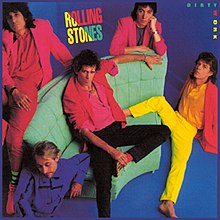
Back Dirty Work (album) Czech Dirty Work Danish Dirty Work (Rolling-Stones-Album) German Dirty Work Greek Dirty Work Spanish Dirty Work Finnish Dirty Work (album) French Dirty Work Croatian Dirty Work (The Rolling Stones) Italian ダーティ・ワーク Japanese
| Dirty Work | ||||
|---|---|---|---|---|
 | ||||
| Studio album by | ||||
| Released | 24 March 1986 | |||
| Recorded | 5 April – 17 June and 16 July – 17 August 1985 | |||
| Studio |
| |||
| Genre | ||||
| Length | 40:03 | |||
| Label | Rolling Stones, Columbia | |||
| Producer | Steve Lillywhite, The Glimmer Twins | |||
| The Rolling Stones chronology | ||||
| ||||
| Singles from Dirty Work | ||||
| ||||
Dirty Work is the eighteenth studio album by the English rock band the Rolling Stones. It was released on 24 March 1986 on the Rolling Stones label by CBS Records, their first under their new contract with Columbia Records. Produced by Steve Lillywhite, the album was recorded during a period when relations between Mick Jagger and Keith Richards had soured considerably, according to Richards' autobiography Life.[4][5]
The album was recorded during a time of turmoil for the band, as its two principal songwriters, Richards and Jagger, had been feuding over the band's direction during most of the 1980s. Almost all of the band members had spent the previous few years working on solo albums or side projects. Some band members, including guitarist Ronnie Wood, drummer Charlie Watts and bassist Bill Wyman, were often absent from the studio during recording sessions; it was rare that all five principal members were together at the same time. It would be the last album to feature former member and frequent piano contributor Ian Stewart, who died shortly before the album's release. As a result, a number of guest musicians appeared on the album, including guitarists Jimmy Page and Bobby Womack. Keyboards were played by Ivan Neville and Chuck Leavell, who would remain with the band for decades. Unlike most Stones albums, there was no supporting tour, as the level of animosity among band members prevented them from being able to work together live onstage.
Dirty Work sold well, reaching platinum or gold status in several countries, including the United States, Canada and the UK, and peaking as a top-10-charting album in over a dozen markets. The album spawned two top-40 hits: a cover of Bob & Earl's song "Harlem Shuffle" and one of the songs written with Ronnie Wood, "One Hit (To the Body)". However, the album was a critical flop, with most critics then and now finding it uneven and uninspired,[6] many reviewers citing the tensions within the band at the time.
- ^ Cite error: The named reference
Boulognewas invoked but never defined (see the help page). - ^ Pareles, Jon (24 March 1986). "Dirty Work". Rolling Stone. Archived from the original on 2 September 2020. Retrieved 30 April 2020.
- ^ "Music Week" (PDF). p. 10.
- ^ Rich, Motoko (1 August 2007). "A Rolling Stone Prepares to Gather His Memories". The New York Times. Archived from the original on 5 June 2015. Retrieved 6 March 2008.
- ^ Richards, Keith (2010). Life. Little, Brown and Company. ISBN 978-0-316-03438-8. OCLC 548642133.
- ^ Banulescu, Eduard (5 September 2023). "The Rolling Stones Albums Ranked: The Story of the World's Premier Rock Band - from Worst to Best". Alt77. Retrieved 28 September 2023.